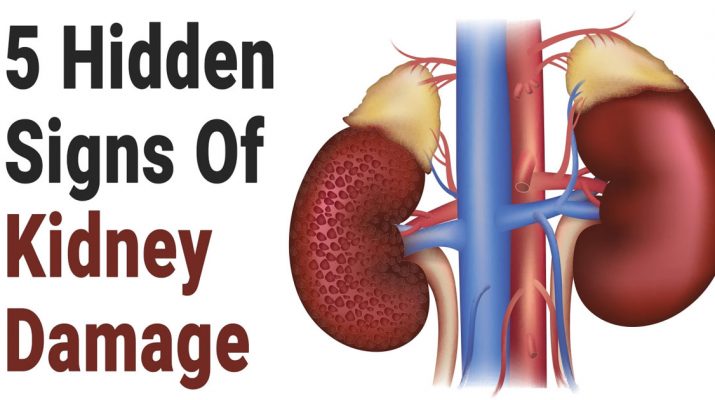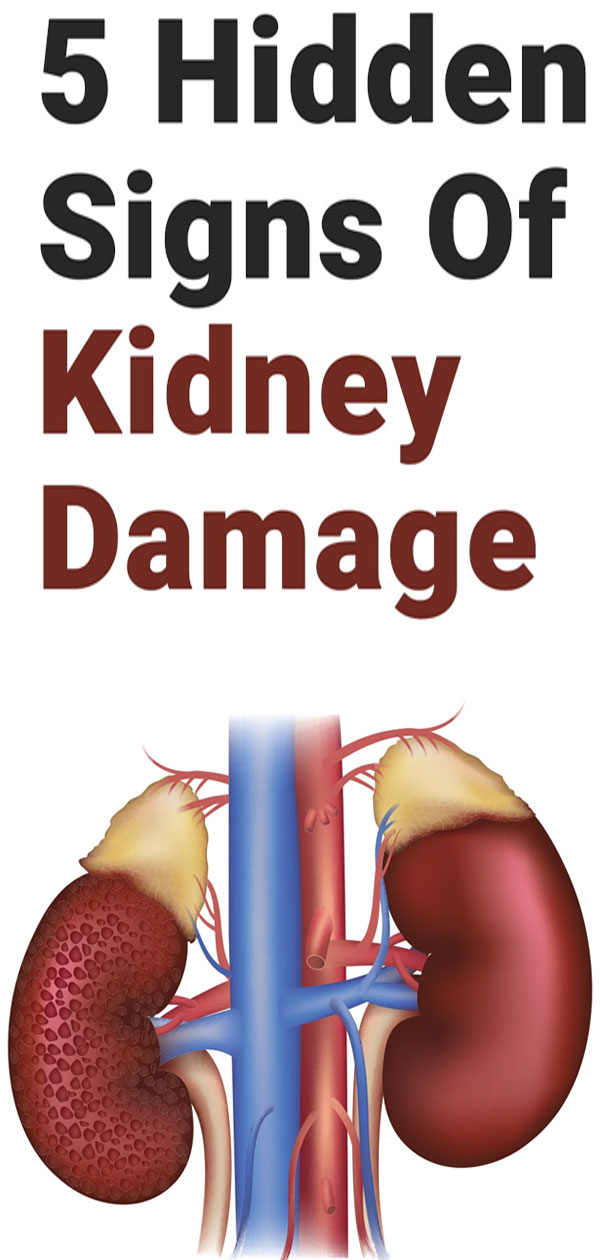Among the vital organs, it’s the problems in the kidneys that are harder to detect. According to experts at the National Institute of Diabetes and Digestive and Kidney Diseases, most people don’t know that they have a kidney disorder unless the problem is already in the advanced stages. There are a variety of indications that may point to kidney damage.
Unfortunately, kidney disease is progressive. It is permanent and irreversible once the problem is already present. Thus, experts recommend getting yearly kidney tests, especially if you’re a high-risk patient, to catch any signs of an impending kidney problem before it’s too late. Here are some hidden signs that could indicate kidney damage.
Here Are 5 Hidden Signs Of Kidney Damage
1. Your Skin Is Dry And Itchy
Healthy kidneys work to retain the right amounts of nutrients your body needs. The kidneys remove toxins and wastes that can impact cell structure, tissues, bones, and organs. If your kidneys are damaged, they can’t properly maintain the balance of nutrients and eliminate toxins. If you notice your skin getting dry and itchy, this could indicate kidney damage.
- A malfunctioning kidney can result in chronic dehydration, where the body eliminates, rather than ingests or absorbs, more fluids.
- If you are losing bodily fluids, you’ll easily develop skin dryness.
- A kidney condition may also prevent your glands from effectively producing natural oils that keep the skin moistened, soft, and supple.
- Dry skin due to a damaged kidney may not only be itchy. It may also be flaky, red, and cause discomfort.
- As the kidney condition worsens, waste in the blood continues to build up. This, in turn, makes the itchiness, redness, and skin irritation more intense and unbearable.
Avoid bathing in hot water if you have dry skin because it could worsen the problem, according to experts at the Baylor College of Medicine. During the cold winter months, bathe in lukewarm water (about 98.6 degrees Fahrenheit) to minimize skin dryness.
Apply a skin moisturizer as soon as you’ve finished taking a bath. Also, don’t use skin care products that contain alcohol and strong ingredients. Use hypoallergenic or organic soap that won’t complicate the skin conditions that are linked to dehydration.
Doctors may prescribe phosphate binders and other medications to control the itchiness. However, remember that any treatment you take orally will still pass through your damaged organ and worsen the kidney disease. So, always proceed with caution and get the proper diagnosis and recommendation from your doctor before taking anything to treat the skin dryness.
2. Your Eyes Are Persistently Puffy
Do you know that kidney diseases and eye problems are linked together? According to the National Kidney Foundation, pay very close attention if you always wake up with puffy or swollen eyes in the morning. This could be a sign of kidney damage.
When your eyes are puffy, it means that your kidneys are leaking protein. The filters of the organ aren’t working right so large amounts of protein are not being properly distributed within your system.
You will know your body is leaking the nutrient if your urine test shows high levels of proteinuria while your blood has low levels of protein. This condition is medically known as a nephrotic syndrome. It may also be accompanied by other symptoms like high cholesterol, high blood pressure, thick and sticky blood, and deep vein thrombosis or leg blood clots.
Doctors may order a kidney biopsy to further determine the course of treatment if your urine test shows that you are positive for protein leak. In most cases, addressing the cholesterol and blood pressure problems through medicines might be the first course. These medications may help lessen the loss of protein and protect the kidneys.
There are strong chances that the condition may improve if the patient follows the treatment plan. In no time, the patient should find his or her eyes looking more normal if the protein leak has been controlled.
3. You Get Muscle Cramps Frequently, Especially At Night
Your body’s electrolyte levels may be imbalanced if you are frequently experiencing muscle cramps, particularly in the nighttime. The electrolyte imbalance is not the cause of the kidney problem but rather the consequence of badly-damaged kidneys.
- The electrolytes are made up of minerals like calcium, chlorine, magnesium, phosphate, and potassium.
- You gain these from the foods you eat and the fluids you drink, which then balances the water and acid in your body.
- If the electrolytes are too high or too low, then the water and acid composition in your body change. It will be up to the kidneys to regulate these changes and concentration.
- A damaged kidney won’t be able to do this function well, hence you experience muscle cramping, among other uncomfortable symptoms.
The crucial nutrients closely tied to the functions of your kidney are sodium, calcium, and phosphate. A blood test will determine the levels of these nutrients in your body before doctors administer any treatment.
Treating an electrolyte imbalance due to a damaged kidney is a challenging goal. But there are many patients with kidney problems who have managed to reduce symptoms like muscle cramping. There are also people who have successfully reduced their risk for electrolyte shortage with proper diet, exercise, and the moderate consumption of sports drinks.
Talk to your doctor if you think your cramps may be related to an electrolyte and kidney problem. In some cases, a stay in the hospital might be necessary to achieve a positive recovery.
4. You Have Sleep Problems And You Lack Energy
What’s keeping you up at night may be caused by what’s happening in your internal organs. Something may feel off inside your body because you still have too many toxins due to a damaged kidney. This can even mess with your sleep cycle.
When your kidneys cannot filter properly, then the toxins and wastes remain in your blood. If your system isn’t clean, you may experience fragmented sleep instead of resting through the night without any interruptions.
For decades, scientists have been finding more and more evidence that links poor sleep to impaired kidney functions. Worse, poor sleep has also been tied to declining kidneys. People who get less than five hours of shuteye at night may have higher risks for developing kidney problems.
Some 97 percent of patients receiving kidney dialysis also experience some form of sleep disorder. Addressing the symptoms of the sleep disorder may help alleviate the kidney condition. You might have to consult with a number of specialists to get the right treatment.
- If your kidneys are not doing their job right, you may also experience feeling more tired and being unable to concentrate.
- While poor sleep might have something to do with this as well, the fatigue you feel may also be due to the build-up of impurities and toxins in your system, which the kidneys should have already eliminated.
- Sometimes, deficiency in red blood cells or anemia may also be causing your body to get easily tired.
- Anemia may, in fact, indicate a growing kidney condition that should be addressed as soon as possible.
Don’t disregard your lack of sleep and tiredness, especially if it’s causing problems with your performance at work and your relationships with people. Get yourself diagnosed and have your urine and kidneys checked as well.
5. You Have Bloody And Foamy Urine
There are many reasons why there could be blood in your urine. In many cases, it’s not a major health problem or a grave concern. You could be suffering from an infection that will easily go away with the proper treatment.
But sometimes, blood could be an indication of kidney damage and it is leaking because the kidney’s filters aren’t working right anymore. There are several types of tests to determine the extent of the condition. (Some of these may be invasive procedures.)
Treating the problem will also depend on what’s really going on in your body. But it’s very important to see a doctor right away, regardless of the amount of blood present in the urine, just so you could have peace of mind.
Now, if your urine forms thick bubbles that are hard to flush, it means that your leaking protein as well. You shouldn’t delay a visit to the doctor if this is the case because your chances of recovery will be higher if you get the problem treated as soon as possible.
Final Thoughts On Hidden Signs Of Kidney Damage
A large part of your life will change once you have kidney disease. Once it fails, you will require dialysis for life or may have to undergo a risky kidney transplant. So, it’s very important to make sure that this organ is healthy and always performing its optimal function.
If you are over 40 years of age, in addition to annual kidney tests, you can take good care of your kidneys by doing the following:
- Eating right and maintaining a healthy weight
- Minimizing your sugar and salt intake
- Staying physically fit and active
- Making sure that your blood sugar level is under control
- Monitoring your blood pressure
- Drinking lots of fluids
- Avoiding cigarettes and alcohol
Whenever possible, you should not make it a habit to take common medications like anti-inflammatory drugs and non-steroidal drugs because these have been proven to cause kidney damage. If you’re suffering from chronic conditions, such as arthritis, it is best to see a specialist who can suggest and recommend the right medicines rather than go for over-the-counter drugs like ibuprofen.
If you have a history of other high risks diseases, such as hypertension, heart disease, or diabetes, getting the annual kidney test is also a must. According to the Center for Disease Control and Prevention, one in three adults with diabetes also have kidney problems, while one in five adults with high blood pressure may develop kidney diseases in due time.
Whenever possible, consult with a dietitian who may be able to recommend a good diet that will help with the health of your kidneys and your general health.


